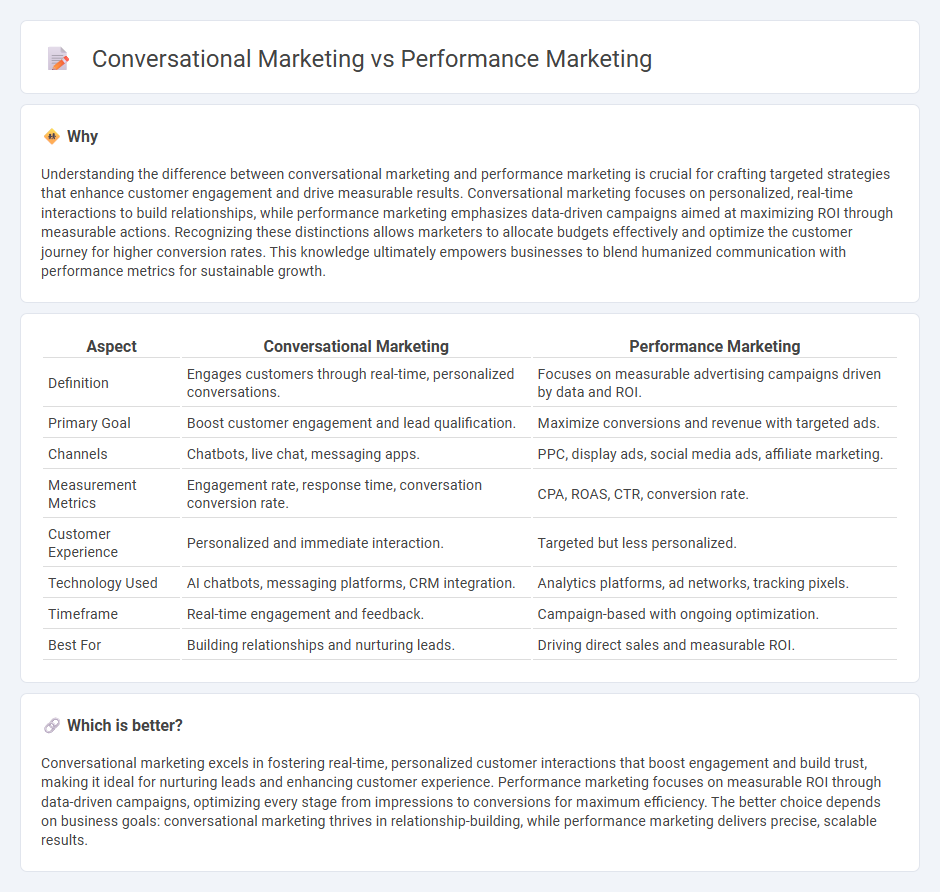
Conversational marketing focuses on real-time, personalized interactions between brands and customers through chatbots, messaging apps, and live chat, enhancing user engagement and satisfaction. Performance marketing emphasizes data-driven strategies with measurable outcomes such as click-through rates, conversions, and ROI to optimize advertising spend and maximize profitability. Explore the key differences and benefits of these marketing approaches to refine your business strategy.
Why it is important
Understanding the difference between conversational marketing and performance marketing is crucial for crafting targeted strategies that enhance customer engagement and drive measurable results. Conversational marketing focuses on personalized, real-time interactions to build relationships, while performance marketing emphasizes data-driven campaigns aimed at maximizing ROI through measurable actions. Recognizing these distinctions allows marketers to allocate budgets effectively and optimize the customer journey for higher conversion rates. This knowledge ultimately empowers businesses to blend humanized communication with performance metrics for sustainable growth.
Comparison Table
| Aspect | Conversational Marketing | Performance Marketing |
|---|---|---|
| Definition | Engages customers through real-time, personalized conversations. | Focuses on measurable advertising campaigns driven by data and ROI. |
| Primary Goal | Boost customer engagement and lead qualification. | Maximize conversions and revenue with targeted ads. |
| Channels | Chatbots, live chat, messaging apps. | PPC, display ads, social media ads, affiliate marketing. |
| Measurement Metrics | Engagement rate, response time, conversation conversion rate. | CPA, ROAS, CTR, conversion rate. |
| Customer Experience | Personalized and immediate interaction. | Targeted but less personalized. |
| Technology Used | AI chatbots, messaging platforms, CRM integration. | Analytics platforms, ad networks, tracking pixels. |
| Timeframe | Real-time engagement and feedback. | Campaign-based with ongoing optimization. |
| Best For | Building relationships and nurturing leads. | Driving direct sales and measurable ROI. |
Which is better?
Conversational marketing excels in fostering real-time, personalized customer interactions that boost engagement and build trust, making it ideal for nurturing leads and enhancing customer experience. Performance marketing focuses on measurable ROI through data-driven campaigns, optimizing every stage from impressions to conversions for maximum efficiency. The better choice depends on business goals: conversational marketing thrives in relationship-building, while performance marketing delivers precise, scalable results.
Connection
Conversational marketing enhances performance marketing by enabling real-time, personalized interactions that increase customer engagement and conversion rates. Data collected from conversational channels informs targeted ad campaigns, optimizing budget allocation and improving ROI. Integrating conversational marketing tools with performance marketing strategies creates a feedback loop that strengthens audience insights and drives measurable business growth.
Key Terms
**Performance Marketing:**
Performance marketing leverages data-driven strategies to optimize campaigns and maximize ROI through measurable actions such as clicks, leads, and sales. It uses targeted advertising channels like PPC, affiliate marketing, and SEO to drive user engagement and conversions efficiently. Discover how performance marketing can boost your business growth and improve marketing effectiveness.
ROI (Return on Investment)
Performance marketing centers on measurable outcomes such as cost per acquisition (CPA), return on ad spend (ROAS), and conversion rates, ensuring a direct link between marketing spend and revenue. Conversational marketing emphasizes real-time, personalized customer interactions through chatbots and messaging platforms, aiming to enhance engagement, nurture leads, and improve long-term customer lifetime value (CLV). Explore the benefits of combining performance and conversational marketing strategies to maximize ROI in your business.
Conversion Rate
Performance marketing employs data-driven strategies across digital channels to maximize conversion rates through targeted ads and measurable ROI, while conversational marketing leverages real-time interactions via chatbots and personalized messaging to engage users and drive conversions by addressing specific needs. Conversion rate optimization in performance marketing relies on A/B testing, audience segmentation, and retargeting, whereas conversational marketing enhances conversion by fostering immediate, context-aware communication that reduces friction in the buyer journey. Explore how integrating both methods can elevate your conversion rates by visiting our detailed guide.
Source and External Links
What Is Performance Marketing? Definition and Beginner's Guide - Performance marketing is a results-driven digital marketing strategy where advertisers pay only when specific measurable actions, like clicks or sales, are achieved, enabling precise tracking and optimization of marketing spend.
Performance-based advertising - Performance marketing, also called pay-for-performance advertising, involves advertisers paying only when measurable outcomes such as acquisitions or sales occur, differentiating it from brand marketing which focuses on awareness and perception.
What is Performance Marketing, & How Does it Work? - This form of digital marketing focuses on tangible, short-term results like clicks or sales, allowing businesses to optimize ad spending and track real-time ROI by paying marketers only upon completion of those actions.
 dowidth.com
dowidth.com